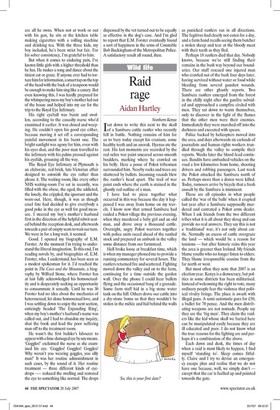Raid rage
Aidan Hartley Northern Kenya Isat down to write this next to the skull of a Samburu cattle rustler who recently fell in battle. Nothing remains of him for us to bury today except his cranium, some healthy teeth and an anorak. Hyenas ate the rest. His last moments are recorded by the red ochre war paint smeared across smooth boulders, marking where he crawled on his belly. Here a posse of Pokot tribesmen surrounded him Nearby rocks and trees are shattered by bullets. Incoming rounds blew the rustler's head apart. The trail of war paint ends where the earth is stained in the ghostly red outline of a man.
I have had to piece together what occurred in this way because the day it happened I was away from home on my travels. I know now that armed Samburu had raided a Pokot village the previous evening, when they murdered a baby girl and an old man, and drove away a thousand cattle. Overnight, angry Pokot warriors together with police units raced ahead of the rustled stock and prepared an ambush in the valley some distance from our farmstead.
Hell broke loose at breakfast time, which is when my manager phoned me to provide a running commentary for several hours. The rustlers returned fire and scattered. Fighting moved down the valley and on to the farm, continuing for a time outside the garden wall. Over the phone I could hear bullets flying and the occasional bang of a grenade. Some farm staff hid in a big stone water tank on the hill. Others drove our cattle into a dry-stone boma so that they wouldn't be stolen in the mêlée and hid behind the walls as panicked rustlers ran in all directions. The fugitives had clearly not eaten for a day, and a farm hand recalls seeing them butcher a stolen sheep and tear at the bloody meat with their teeth as they fled.
Perhaps 18 rustlers died that day. Nobody knows, because we're still finding their remains in the bush way beyond our boundaries. Our staff rescued one injured man who crawled out of the bush four days later, having survived without water or food while bleeding from several gunshot wounds. There are other ghastly reports. Two Samburu rustlers emerged from the forest in the chilly night after the gunfire subsided and approached a campfire circled with men. They sat down to warm themselves, only to discover in the light of the flames that the other men were their enemies. Immediately they were marched off into the darkness and executed with spears.
Police backed by helicopters moved into the area, and days afterwards six carloads of journalists and human-rights workers trundled through the valley to compile their reports. Weeks later the blood feud continues. Bandits have ambushed vehicles on the road a few kilometres from home, shooting drivers and robbing passengers. Last week the Pokot attacked the Samburu north of us. Perhaps more than a dozen were killed. Today, rumours arrive by bicycle that a fresh assault by the Samburu is imminent.
These are all episodes in what people called the 'war of the balls' when it erupted last year after a Samburu supposedly murdered and castrated a Pokot arms dealer. When I ask friends from the two different tribes what it is all about they shrug and can provide no real answers. They say this is not a 'traditional' war; it's not only about cattle. Normally an excess of cattle overgraze the land — which would be a reason for tensions — but after historic rains this year the area is greener than Ireland. My friends blame youths who no longer listen to elders. They blame irresponsible cousins from the far north or west.
But most often they note that 2007 is an election year. Kenya is a democracy, but politics in some districts has been militarised. Instead of welcoming the right to vote, many ordinary people fear the violence that political rivalry brings. The place is awash with illegal guns. A semi-automatic goes for £50, a bullet for 70 pence. And the men distributing weapons are not nomads. People say they are the 'big men'. They claim the raiders like the kid whose skull we buried here can be manipulated easily because they are ill educated and poor. I do not know what the true reasons for the fighting are and perhaps it's a combination of the above.
Each dawn and dusk, the times of day when a raid is most likely to happen, I find myself 'standing to'. Sleep comes fitfully. Claire and I try to devise an emergency escape plan and realise that we do not have one because, well, we simply don't — except that the car is fuelled up and pointed towards the gate.








































 Previous page
Previous page